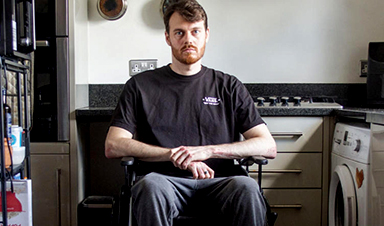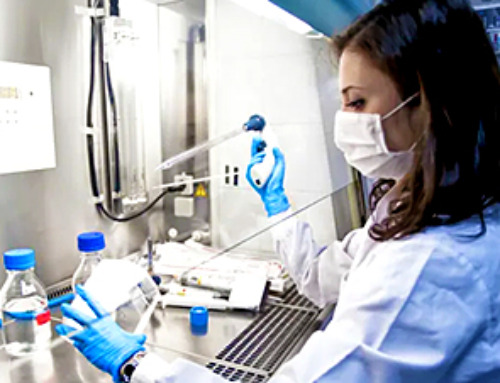When Alex Sprackland caught Covid-19 in March 2020, he thought he'd be back to normal in no time. Yet, five years on, the 34-year-old still grapples with the severe, life-limiting effects of the infection.
'I was diagnosed with long Covid seven months after my initial illness – my life has never been the same,' Alex, from Tunbridge Wells, tells Metro. 'I had to leave my flat, I lost my relationship, and I moved back in with my parents. I also dropped out of university when I became too sick to finish the course.
'I can't even work, but there's no support for me. No treatments. Nothing.'
After contracting the virus, Alex developed a series of symptoms that included an irregular heartbeat, breathlessness, ongoing pain and digestive problems. Initially he was misdiagnosed with chronic fatigue syndrome and prescribed 'graded exercise' by his GP, which only worsened his symptoms.
Alex bounced between numerous specialists, none of whom could help. 'It was demoralising, especially when people didn't believe me about the symptoms,' he remembers.
Six months later Alex was finally referred to the NHS long Covid service, but says, 'no one knew what to offer me. I ended up going to a private clinic instead and they started some experimental treatments.'
However, the decision cost him his place at the NHS clinic, as he was pursuing 'off-label treatments'.
Although 120 specialised long Covid clinics opened in England and Wales in 2021, today there are less than 50 – and Alex is now paying for private healthcare out of his limited savings and Personal Independence Payment (PIP) to find answers.
He is one of approximately 2million people in the United Kingdom with the condition, a chronic, systemic disease that can cause a range of long-term health issues, such as severe fatigue, difficulty breathing, chest pain and memory problems.
'It's all a gamble to find trustworthy information; no one knows enough,' says Alex, who relies on a wheelchair. 'I spend 99% of the time in my room and haven't seen most of my friends for five years. I'm watching all their lives pass me by, which is probably the hardest thing to deal with, over the symptoms.'
School became impossible
Avalyn Godfrey, 16, knows the feeling all too well. After catching coronavirus in October 2021 at age 12, she developed long Covid with symptoms of debilitating fatigue, breathlessness, dizziness, sensory issues and brain fog.
Once a super active kid, Avalyn's energy slowly disappeared, making lessons impossible to keep up with. After transferring to a more understanding school, where a teacher who also had long Covid advocated for her, the teen's worsening symptoms made homeschooling the safest option.
She has since completed six GCSEs at home, but finds it hard to maintain her social life.
'When you are not in school as a teenager, there aren't many ways to keep contact with your friends,' Avalyn tells Metro from her home in Cheshire.
After fighting for over a year to get an official diagnosis, which was delayed by doctors dismissing the teen as 'looking for attention', shewas referred to an NHS long Covid clinic.
However, Avalyn's mother, Donna McParland, says treatments were limited and the clinic initially insisted she meticulously log every activity, which her daughter didn't have the energy to do.
Then, they moved on to teaching Avalyn about 'pacing' – an activity management technique used amongst people with chronic illness to help people balance symptoms with everyday life – and carrying out numerous tests, which all came back normal.
'When we have appointments, they tell us about new medical studies or tests they're doing and for a second, you think, "Oh, that's great,' says Avalyn. 'But then nothing happens.'
Avalyn hopes that her symptoms will improve over time and that one day, better treatments will be discovered. In the meantime, she's focusing on achieving her dream of becoming a primary school teacher.
'I've always wanted to be a teacher and I love working with kids; it just feels like something I'm good at,' she says, hopefully.
'I had to go through an ill-health dismissal'
Mum of two Jenny Sullivan has also navigated the challenges of long Covid support. A dedicated English teacher with boundless energy and a fierce passion for her work; when she caught coronavirus in September 2023, everything changed.
After developing severe long Covid symptoms, Jenny was left unable to stand due to dizziness, while also suffering from frequent fatigue and a marked decline in her overall health. She also lives with MCAS (Mast Cell Activation Syndrome), a rare disease that results in a range of allergy-like symptoms.
After nearly three months of worsening symptoms, Jenny, who lives in Tonbridge, went to the GP for the first time, starting a long journey to diagnosis and treatment for long Covid.
'I was signed off work but thought I would be returning soon – then I found out there was a six-month waiting list to see the cardiologist for my symptoms,' she tells Metro.
'It was excruciating to realise, over time, that I wasn't well enough to work and I had to go through an ill-health dismissal – then it was even worse to realise there were no decent treatments to help me.'
Jenny was referred to her local NHS long Covid clinic, but found they couldn't offer her any advice except pacing and some limited treatments for postural orthostatic tachycardia syndrome (POTS), a condition that causes rapid increases in heart rate and has been diagnosed in many long Covid patients.
Eventually, she decided to seek help privately and now travels to Liverpool to see specialist Dr Binita Kane, who also treats Alex.
'The problem is, long Covid specialists are so rare and I have to travel so far to see mine to get stabilised just a little,' says Jenny from her home, having transitioned from a desk to bed to preserve energy while speaking.
'The lack of NHS treatment means that some people pay thousands to untrained and unqualified individuals promising 'miracle cures'; it's easy for opportunists to oversell when there are no alternatives.'
Now unable to work for nearly 18 months, Jenny uses a mobility scooter for outings, which has given her more access to the outside world. However, most of her life is still centred around resting in bed, and she is investing in private care in the hopes of improving her quality of life.
But she is limited by time, cost and distance. A single private consultation can cost up to £500, wait times are still up to six months, and Jenny has to travel for access to care, sapping her already diminished energy.
Despite the need for long Covid care still being apparent, many sufferers are facing a dearth of support with doctors who don't have the funding or knowledge required.
Dr Nikita Kanani, MBE, a GP with extensive experience working with long Covid patients, says that 'GPs are doing their best, but they're often working without the tools or capacity they need.
'There's been some education and guidance, but it's not consistent, and many are managing complex cases without access to the specialist support or multidisciplinary pathways they need to refer into.'
An NHS England spokesperson told Metro: 'More than 100,000 people have been supported by specialist Long Covid clinics since 2020, with NHS staff helping them deal with the physical, cognitive, and psychological effects of Covid-19.
'National guidance and funding has been issued to local health leaders to help them create Long-Covid services which best meet the needs of their local area.'
Looking for answers
However, Alex says he has had to become his 'own doctor in many ways.'
He explains: 'I am reading the latest research, finding new potential treatments, and then looking for doctors who will prescribe the medications or try the new protocol I recommend. It's exhausting.'
While energy-draining, Alex admits that being proactive in his treatment helps alleviate some of the frustration. As part of the Long Covid campaign group, Not Recovered UK, he has also helped raised upwards of £12,000 for research.
Avalyn, too, has directed her attention toward raising awareness, working with organisations like Long Covid Kids and writing her own children's book, called 'Star Dizzy Lizzy', to educate young people.
Andrea from Long Covid Support believes the answer lies in improving research and maintaining the precious few clinics that remain.
'Research is essential; we need it for diagnostics, for treatment, before we even think about rehabilitation,' she says.
Dr Kanani agrees: 'the scale of suffering from long Covid should justify faster investment in trials and early access schemes. We need a system that can act with urgency, rather than waiting for absolute certainty before supporting patients.'
Beyond stopping the closure of these much-needed clinics, Alex says, too many people think 'Coronavirus doesn't exist anymore'.
He adds: 'we are the unfortunate aftermath of the pandemic that people don't want to think about. They just want to put their things in their ears and move on with life. We can't do that though, because we're living with long Covid.'
News
Urgent warning over deadly ‘brain swelling’ virus amid fears it could spread globally
Airports across Asia have been put on high alert after India confirmed two cases of the deadly Nipah virus in the state of West Bengal over the past month. Thailand, Nepal and Vietnam are among the [...]
This Vaccine Stops Bird Flu Before It Reaches the Lungs
A new nasal spray vaccine could stop bird flu at the door — blocking infection, reducing spread, and helping head off the next pandemic. Since first appearing in the United States in 2014, H5N1 [...]
These two viruses may become the next public health threats, scientists say
Two emerging pathogens with animal origins—influenza D virus and canine coronavirus—have so far been quietly flying under the radar, but researchers warn conditions are ripe for the viruses to spread more widely among humans. [...]
COVID-19 viral fragments shown to target and kill specific immune cells
COVID-19 viral fragments shown to target and kill specific immune cells in UCLA-led study Clues about extreme cases and omicron’s effects come from a cross-disciplinary international research team New research shows that after the [...]
Smaller Than a Grain of Salt: Engineers Create the World’s Tiniest Wireless Brain Implant
A salt-grain-sized neural implant can record and transmit brain activity wirelessly for extended periods. Researchers at Cornell University, working with collaborators, have created an extremely small neural implant that can sit on a grain of [...]
Scientists Develop a New Way To See Inside the Human Body Using 3D Color Imaging
A newly developed imaging method blends ultrasound and photoacoustics to capture both tissue structure and blood-vessel function in 3D. By blending two powerful imaging methods, researchers from Caltech and USC have developed a new way to [...]
Brain waves could help paralyzed patients move again
People with spinal cord injuries often lose the ability to move their arms or legs. In many cases, the nerves in the limbs remain healthy, and the brain continues to function normally. The loss of [...]
Scientists Discover a New “Cleanup Hub” Inside the Human Brain
A newly identified lymphatic drainage pathway along the middle meningeal artery reveals how the human brain clears waste. How does the brain clear away waste? This task is handled by the brain’s lymphatic drainage [...]
New Drug Slashes Dangerous Blood Fats by Nearly 40% in First Human Trial
Scientists have found a way to fine-tune a central fat-control pathway in the liver, reducing harmful blood triglycerides while preserving beneficial cholesterol functions. When we eat, the body turns surplus calories into molecules called [...]
A Simple Brain Scan May Help Restore Movement After Paralysis
A brain cap and smart algorithms may one day help paralyzed patients turn thought into movement—no surgery required. People with spinal cord injuries often experience partial or complete loss of movement in their arms [...]
Plant Discovery Could Transform How Medicines Are Made
Scientists have uncovered an unexpected way plants make powerful chemicals, revealing hidden biological connections that could transform how medicines are discovered and produced. Plants produce protective chemicals called alkaloids as part of their natural [...]
Scientists Develop IV Therapy That Repairs the Brain After Stroke
New nanomaterial passes the blood-brain barrier to reduce damaging inflammation after the most common form of stroke. When someone experiences a stroke, doctors must quickly restore blood flow to the brain to prevent death. [...]
Analyzing Darwin’s specimens without opening 200-year-old jars
Scientists have successfully analyzed Charles Darwin's original specimens from his HMS Beagle voyage (1831 to 1836) to the Galapagos Islands. Remarkably, the specimens have been analyzed without opening their 200-year-old preservation jars. Examining 46 [...]
Scientists discover natural ‘brake’ that could stop harmful inflammation
Researchers at University College London (UCL) have uncovered a key mechanism that helps the body switch off inflammation—a breakthrough that could lead to new treatments for chronic diseases affecting millions worldwide. Inflammation is the [...]
A Forgotten Molecule Could Revive Failing Antifungal Drugs and Save Millions of Lives
Scientists have uncovered a way to make existing antifungal drugs work again against deadly, drug-resistant fungi. Fungal infections claim millions of lives worldwide each year, and current medical treatments are failing to keep pace. [...]
Scientists Trap Thyme’s Healing Power in Tiny Capsules
A new micro-encapsulation breakthrough could turn thyme’s powerful health benefits into safer, smarter nanodoses. Thyme extract is often praised for its wide range of health benefits, giving it a reputation as a natural medicinal [...]






















